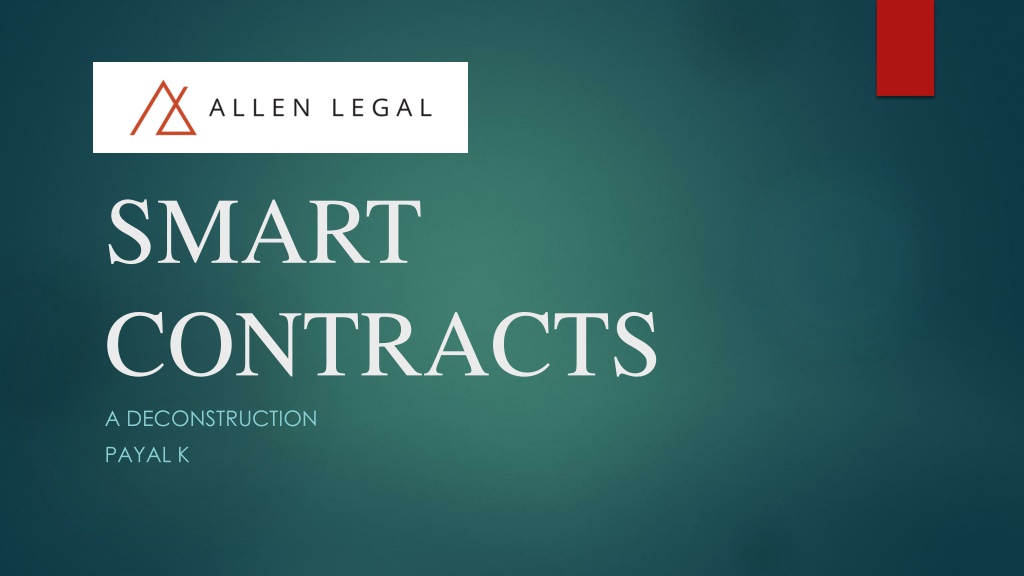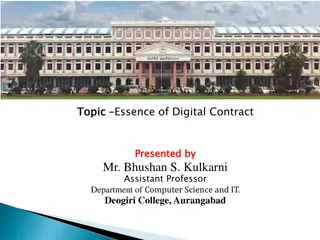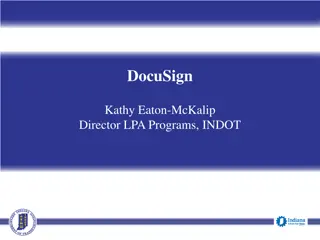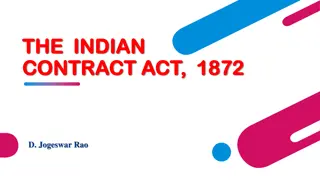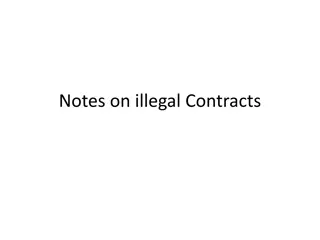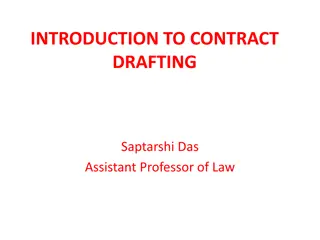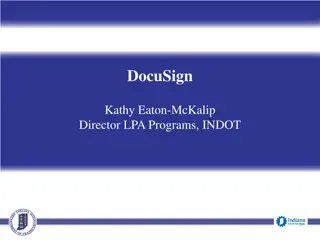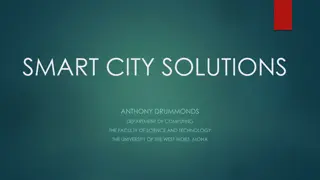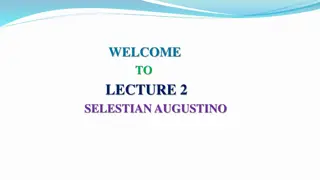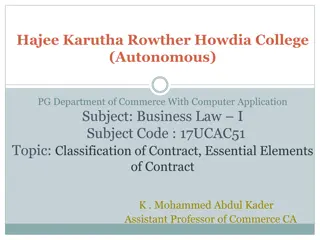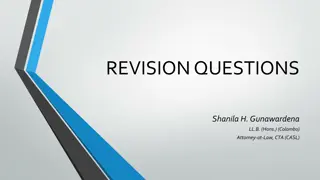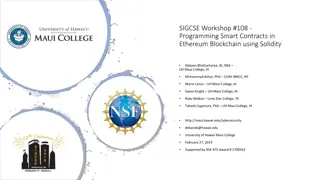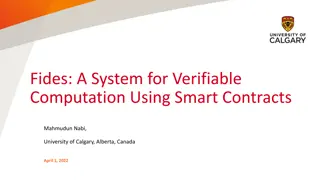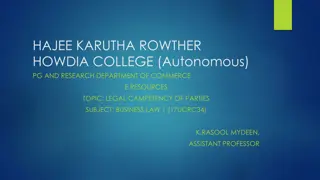Exploring the Future of Smart Contracts in Legal Practice
Delve into the potential of smart contracts as the future of legal agreements, bridging the gap between current law and technological innovations. Understand the components, tests, and role of the judiciary in smart contract validation. Discover the benefits, challenges, and safeguards of smart contracts, including their immunity to fraud and tampering. Explore what can go wrong in smart contracts and how to address issues such as mistakes, capacity constraints, illegal contracts, and termination considerations.
Download Presentation

Please find below an Image/Link to download the presentation.
The content on the website is provided AS IS for your information and personal use only. It may not be sold, licensed, or shared on other websites without obtaining consent from the author. Download presentation by click this link. If you encounter any issues during the download, it is possible that the publisher has removed the file from their server.
E N D
Presentation Transcript
SMART CONTRACTS A DECONSTRUCTION PAYAL K
PREMISE OF DISCUSSION Premise of discussion Smart contracts are the way of the future, but need to be sufficiently tweaked to reduce the gap between the law as it stands today and smart contract mechanisms. The idea of today s discussion is to effectively reverse engineer a smart contract to make it worthy to stand a judicial test.
COMPONENTS OF A TRADITIONAL CONTRACT OFFER ACCEPTANCE CONSIDERATION
ROLE OF THE JUDICIARY Why have judicial intervention for contracts? To remedy mistakes, to adjudicate on issues and disputes and to ensure that contracts entered into are legally binding, and enforceable.
SOME SMART FACTS Smart contracts are immune to various types of fraud, uniquely tamper proof and are even unaffected by court issued injunctions. Ideally a smart contract will be written, distributed, run and paid out in such a way that there is no single party which can stop a smart contract's operations, because no single party controls a smart contract in any of its critical operations, bilateral control being shared among many parties.
SMART CONTRACTS If/Then variables Proof of performance avoids dispute resolution on the basis of data proving the contractual performance Any addendums, additional documents can be a part of this Add a signatory Provide for pre-payment in escrow Reliable reputation about fulfilment of future agreements
WHAT CAN GO WRONG? Mistakes cannot be remedied: mistakes in law, mistakes of fact Capacity to contract - legal capacity to enter into a contract: minors, mentally ill, intoxicated Illegal or void contracts? Undue influence, duress? What rules can apply, if any? jurisdiction unclear Termination of the contract? Remedies? - how would specific performance, injunctions be dealt with?
Privacy implications (hard to wiretap). Cross border transactions. Lack of regulation in a decentralized marketplace where effectively blockchain gets rid of a clearinghouse . Decentralised market with no middleman, no regulation, need for licensed market is reduced. What does this mean for the public at large? -fluctuations in financial instrument prices. Regulatory aspect difficult to clamp down on illegal activity Banks and financial institutions KYC and anti-money laundering. ISSUES No requirement for a clearing house/ middleman and therefore no e-commerce delays. Ease of use. Transparency in governance. From archiving perspective Proof /evidence of timestamping/ existence Once entered cannot be undone. Thomas Friedman s Lexus and the Olive Tree and how this ties in with globalisation. BENEFITS
SOMETHING TO THINK ABOUT Illustration by Lars Leetaru Just like ATMs and non branch, online banking was a revolution in its own time, so too, blockchain based contracts would mean a paradigm shift in how we operate.
SOMETHING TO THINK ABOUT .Blockchain might streamline transaction processing by establishing a single source of truth, available to all, updated in near-real time. This could increase the speed of exchange, reduce the number of intermediaries (and the costs associated with them), improve security, digitize assets, give wider access to people who don t have bank accounts, enable better bookkeeping, and improve regulatory compliance. by John Plansky, Tim O Donnell and Kimberly Richards
SOMETHING TO THINK ABOUT To quote Aaron Wright and Primavera De Filippi, (and give credit where credit is due!) it can be seen that if we want to preserve the opportunities provided by emerging blockchain technologies in terms of individual freedoms and emancipation, democratic institutions, and the creative expression while avoiding or reducing to the minimum the possible drawbacks that they might introduce in society, the time has come to start thinking about a new paradigm of law that could balance the power of blockchain technology and emerging autonomous systems in way that promote economic growth, free speech, democratic institutions and the protection of individual liberties.
#BLOCKCHAINSNOTBORDERS Estonia And Its Foresight Use the public notary to sign and permanently record your legal documents on the blockchain a public ledger distributed amongst hundreds of thousands of computers around the world. The process of filing the document in the blockchain is called time-stamping it proves your record existed at a given time, eliminating any possibility of forgery. Blockchain notarization is an effective way to record marriage contracts, wills, birth certificates, child care contracts, land titles and business deals, among many other records. The security of the blockchain protects the document permanently, ensures its easy access, and proves its authenticity and ownership anytime you need it.
SOME EXAMPLES Trust-less systems such as electronic voting machine example in India and most recently in the US. E-Commerce examples openbazaar.com Using multisig p2p contracts to buy and sell products no middlemen , but only available in Bitcoin for the moment. Examples of royalties received in the music industry or similar examples we can use to add a royalty every time someone has used it and a fee is accordingly calculated. Where archiving comes into the picture relativity and ringtail. Lexus and the Olive Tree what this means in the context of borderless blockchains. The tipping point: Tax collected for the first time by a government via a blockchain Expected date: 2023 By 2025: 73% of respondents expected this tipping point to have occurred. The blockchain creates both opportunities and challenges for countries. On the one hand, it is unregulated and not overseen by any central bank, meaning less control over monetary policy. On the other hand, it creates the ability for new taxing mechanisms to be built into the blockchain itself (e.g. a small transaction tax).
Global Agenda Council on the Future of Software & Society http://www3.weforum.org/docs/WEF_GAC15_Technological_Tipping_Points_report_2015.pdf#page=24
Global Agenda Council on the Future of Software & Society http://www3.weforum.org/docs/WEF_GAC15_Technological_Tipping_Points_report_2015.pdf#page=24
THE INTERNET OF THINGS AI IN SMART CONTARCTS What if AI was injected into a smart contract? This would mean that the model would have the ability to think and include decision making processes in the execution of the contract. Is it possible to code ethics into AI, however?
